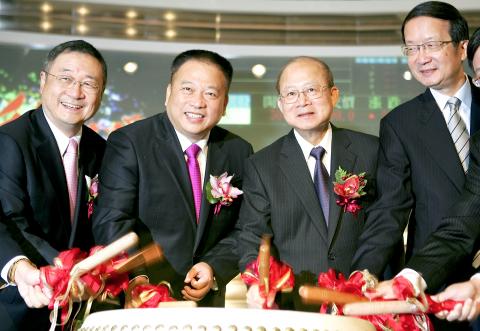Shares of TPK Holding Co (宸鴻), which supplies touch panels for Apple Inc’s iPhone, more than doubled their initial public offering price (IPO) on their first trading day yesterday, closing 129.6 percent higher and outperforming the main bourse, which slid 0.8 percent.
TPK opened at NT$500 on its debut on the Taiwan Stock Exchange, surging from its IPO price of NT$220. The stock ended at NT$505 after pulling back from an intraday high of NT$527.
TPK makes glass and film-based touch screens for Apple, HTC Corp (宏達電), Samsung Electronics Co and LG Electronics Co.

Photo: Maurice Tsai, Bloomberg
While its strong debut indicated investors’ interest in snapping up shares of the touch-screen supplier, its local peers did not fare well and saw their shares drop amid portfolio adjustments.
Young Fast Optoelectronics Co (洋華), which supplies touch-screen modules to HTC, fell 3.2 percent to NT$360; Wintek Corp (勝華), which supplies touch panels to Apple and Nokia, dropped 1.53 percent to NT$51.60; and smaller rival J Touch Corp (介面光電) closed limit-down at NT$118.50.
“TPK really is the ‘Touch Panel King,’ and it will be hard for others to catch up in the short term,” Calvin Shao, who rates the stock “buy” at SinoPac Securities Co (永豐金證券), told Bloomberg yesterday. “Touch panels have the greatest momentum in the technology industry and TPK has the best technology.”
TPK on Thursday reported a third-quarter net income of NT$1.13 billion (US$36.7 million), up 56.9 percent year-on-year and 9 percent quarter-on-quarter, although its gross margin fell to 14.3 percent from 23.7 percent in the second quarter.
Nonetheless, analysts were positive on TPK’s revenue and earnings outlooks next year, given its superior technology in capacitive touch solutions, Capital Securities Corp (群益證券) said in a note yesterday.
The local brokerage said it expected the stock to rise to NT$545 in three months and further to NT$640 in a 12-month period.
“As one of the world’s foremost touch-panel makers and Apple’s largest long-term partner in the segment, TPK is set for significant growth over 2010-2012,” Hong Kong brokerage CLSA said in a separate note issued on Thursday.
CLSA had a target price of NT$506 for TPK, while Nomura’s target was NT$520.

To many, Tatu City on the outskirts of Nairobi looks like a success. The first city entirely built by a private company to be operational in east Africa, with about 25,000 people living and working there, it accounts for about two-thirds of all foreign investment in Kenya. Its low-tax status has attracted more than 100 businesses including Heineken, coffee brand Dormans, and the biggest call-center and cold-chain transport firms in the region. However, to some local politicians, Tatu City has looked more like a target for extortion. A parade of governors have demanded land worth millions of dollars in exchange

Hong Kong authorities ramped up sales of the local dollar as the greenback’s slide threatened the foreign-exchange peg. The Hong Kong Monetary Authority (HKMA) sold a record HK$60.5 billion (US$7.8 billion) of the city’s currency, according to an alert sent on its Bloomberg page yesterday in Asia, after it tested the upper end of its trading band. That added to the HK$56.1 billion of sales versus the greenback since Friday. The rapid intervention signals efforts from the city’s authorities to limit the local currency’s moves within its HK$7.75 to HK$7.85 per US dollar trading band. Heavy sales of the local dollar by

Taiwan Semiconductor Manufacturing Co’s (TSMC, 台積電) revenue jumped 48 percent last month, underscoring how electronics firms scrambled to acquire essential components before global tariffs took effect. The main chipmaker for Apple Inc and Nvidia Corp reported monthly sales of NT$349.6 billion (US$11.6 billion). That compares with the average analysts’ estimate for a 38 percent rise in second-quarter revenue. US President Donald Trump’s trade war is prompting economists to retool GDP forecasts worldwide, casting doubt over the outlook for everything from iPhone demand to computing and datacenter construction. However, TSMC — a barometer for global tech spending given its central role in the

The Financial Supervisory Commission (FSC) yesterday met with some of the nation’s largest insurance companies as a skyrocketing New Taiwan dollar piles pressure on their hundreds of billions of dollars in US bond investments. The commission has asked some life insurance firms, among the biggest Asian holders of US debt, to discuss how the rapidly strengthening NT dollar has impacted their operations, people familiar with the matter said. The meeting took place as the NT dollar jumped as much as 5 percent yesterday, its biggest intraday gain in more than three decades. The local currency surged as exporters rushed to